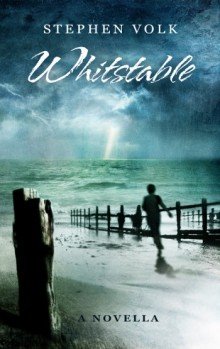Reviewed by Andy Hedgecock
We’re on the Northeast Kent coast in 1971. There are few witnesses to a child’s fear and anguish here – just the oysters for which the town of Whitstable is famous and Peter Cushing, the aging Hammer Horror star struggling to cope with the shattering loss of Helen, his beloved wife.
Cushing, a British movie legend for whom no-one had a bad word, is portrayed as a thoroughly decent human being, but also a complex and damaged one: uxorious almost to the point of self-destruction, wracked with self-doubt and all but overwhelmed with loneliness. A contemplative walk to the seafront brings a chance encounter with a young boy called Carl, who is falling victim to the depravity of Les, his mother’s boyfriend. Carl is so obsessed by Cushing’s life-or-death battles onscreen he is unable to discriminate the actor from his most popular role – as the vampire hunter Van Helsing.
Carl’s imagination protects him from the ghastly truth and enables him to recast Les as a vampire. The dramatic tension comes from Cushing’s attempt to apply his own form of ‘make believe’ to the task of saving Carl from Les, and the mighty labour of saving himself from the state of psychological purgatory he entered with the death of Helen.
Whitstable is a thoroughly entertaining read, but not a comfortable one. There’s nothing cosy or reassuring in a narrative centring on child sexual abuse and the grief of a prematurely aging actor. And the book is not easy to categorise: it’s a blend of psychological thriller, obsessively researched biography, gonzo film criticism, elliptical memoir of the early 1970s and a fan’s tribute to a cinematic hero.
Stephen Volk has taken some massive risks with his new novella: clumsy handling of these ingredients could have created a tossed salad of incoherence and mawkish sentiment. But readers are in safe hands: the sensitivity, technical virtuosity and razor-sharp wit of the author’s storytelling make Whitstable an entertaining, emotionally resonant and insightful read.
Cards on the table: I am a longstanding admirer of Volk’s screenplays and short stories and have been looking forward to this rare departure into longer prose work for a while. He is, perhaps, best known for giving the BBC a War of the Worlds moment with the notorious hoax-drama Ghostwatch, broadcast on Halloween 1992. But he also co-wrote The Awakening, a subtly unsettling feature starring Rebecca Hall; created the scary, and scarily underrated, TV drama series Afterlife for ITV; scripted movies by Ken Russell and William Friedkin; and wrote Dark Corners, a short story collection of considerable thematic variety and stylistic range.
Much of Volk’s fictional output is supernatural horror, so it’s unsurprising there are hauntings in Whitstable. None of these is supernatural. Carl is haunted by the vile actions of Les; Les is haunted by demons of his own; and poor Cushing is more haunted than Borley Rectory. He is plagued by fears for Carl, by his all but unbearable loss and by a deep seated sense of his own limitations, professional and personal.
It is a complete coincidence that Whitstable is published in the wake of the tabloid press exploiting the deaths of six children in a house fire in Derby to cheerlead the government’s welfare cuts. But Volk’s tale of social engagement and compassion is an antidote to that kind of callous manipulation. It’s challenging, yet there’s something essentially life affirming about Carl’s resilience and Cushing’s determination to protect a vulnerable child.
The story is nicely paced – the dramatic climax comes well before the final scene, but it’s apt for it to close with a leisurely reflection on Cushing’s psychological journey. The central conceit involves using the tropes, structure and atmosphere of cinematic tales of supernatural horror to reflect and examine real-life shock and dread. This works to devastating effect.
And the book is crammed with fascinating detail: not just the Raleigh ‘Chopper’ bike and throwaway allusion to a Scottish midfielder whose medical condition scuppered a high profile transfer; there are also fascinating nuggets about Cushing’s career and British genre movies of the post-war era. All of this material is carefully worked into the narrative – some readers will let it wash over them, others will treat themselves to a spell of furious googling. Neither activity will detract from their enjoyment of this gripping and illuminating story.
Stephen Volk is at the top of his game with this novella. These are hard times and Whitstable isn’t a cheap read, but it is a rewarding one. An enthusiastic salute to a towering figure in British cinema, a perceptive exploration of the link between imagined and experienced horror and one of the most gripping and original stories you’ll read this year.
Limited edition hardback: £17.50 plus £2.50 p+p (= £21).Unlimited paperback: £14 inclusive of p+p
Publication date: May 26th 2013












